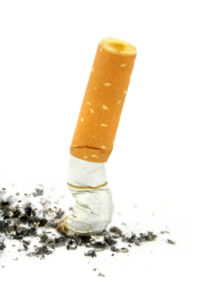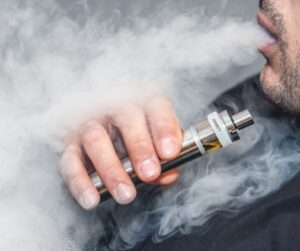
Our nation is dealing with dire consequences of addiction. Whether alcohol, smoking or drugs, we are all paying the price. In this article, I’d like to focus on smoking and vaping.
From information shared by the Oral Cancer Foundation…
“Scientists have found that nicotine is as addictive as heroin, cocaine or amphetamines”
A New York Times Magazine article shared: “Nicotine, Harder to Kick than Heroin”
“Nicotine is similar in all critical measures to prototypic drugs of abuse such as cocaine, morphine and heroin.”
“Nicotine is a poison used as an insecticide.”
https://oralcancerfoundation.org/understanding/tobacco/tobacco-and-addiction/
Scary stuff. I’d like to share just some of the concerning repercussions from the use of tobacco products and e-cigs (vaping devices).
Studies have shown that people who smoke have more tartar than non-smokers. Tartar is a cement-hard buildup on teeth, actually a concentrated mass of oral bacteria.
In studies, smokers were 3 – 6 times more likely to develop gum disease than non-smokers. One reason is because the chemicals in cigarette smoke are very drying to oral tissues and decreases saliva production. Less saliva leaves the mouth with less of its natural cleansing agent designed to reduce bacteria in the mouth. Without saliva’s rinsing action, higher concentrations of oral bacteria exist.
Dry tissues also cause slower healing in the mouth. The longer it takes for tissues to heal, the greater the potential for bacterial complications.
For dental implant patients, research indicates that dental implants in smokers are less able to fully complete osseointegration with the bone. This is the process in which the bone surrounding the implant grows around it to secure it in place. Added to this challenge is a reduced ability to fight off infection after implant placement. When gums are weakened by an over-accumulation of bacteria, successful integration of the implants with bone is compromised. While smoking is a risk factor for implant failure, it is also detrimental for conventional bridgework.
Not only does tobacco use diminish the ability of gum tissue to heal, studies show that smokers are 15% more likely to have dental implant failure compared to people who do not use tobacco.
Don’t smoke but live or work with a smoker? British researchers released result of studies that included several major countries and tracked nearly 7,000 adults, with nearly half being exposed to secondhand smoke.
https://www.upi.com/Health_News/2021/04/27/cigarettes-secondhand-smoke-cancer/7401619527124/
The findings showed that breathing in the smoke of another person’s cigarette can increase the risk of oral cancer (lip, mouth and throat cancers) by more than 50%. They also determined that secondhand smoke equates to actually smoking half as many cigarettes as the user they live or work with for the non-smoking.
It’s no secret to smokers that their health is compromised by smoking. However, some statistics should be more common knowledge. Such as:
• Smokers die 10 years earlier than nonsmokers, on average.
• For every person who dies because of smoking, at least 30 people live with a serious illness related to smoking.
• Smoking leads to disease and disability and harms nearly every organ of the body.
When considering the mouth, smoking can create costly problems in addition to a higher risk of tooth loss. Cigarette smoking has long been associated with periodontal (gum) disease, and periodontitis, which is an advanced stage of gum disease. This is a cause of bone loss of the supportive structures of teeth and subsequent tooth loss.
Nicotine (in any form) has been shown to reduce blood flow in the gum tissues in the mouth. Yet, vaping hit the market being perceived as a “safer” alternative to cigarette smoking. Yet, vaping, which delivers nicotine through a nicotine-laced mist, is no less harmful to the user as that delivered via cigarette smoke. A study published by iScience showed that 73% among smokers had gum disease and oral infections, 43% of e-cigarettes users did, also.
 Some cigarette users also switched to vaping as a way to wean off cigarettes. This has proven to have been a monumental failure. According to a 2018 report by the National Academy of Sciences, Engineering & Medicine, there was “evidence that e-cigarette use increases the frequency and intensity of cigarette smoking in the future.”
Some cigarette users also switched to vaping as a way to wean off cigarettes. This has proven to have been a monumental failure. According to a 2018 report by the National Academy of Sciences, Engineering & Medicine, there was “evidence that e-cigarette use increases the frequency and intensity of cigarette smoking in the future.”
https://www.cdc.gov/tobacco/basic_information/e-cigarettes/surgeon-general-advisory/index.html
Studies show, too, that the inhaled nicotine through vaping can alter the genetic makeup of your cells. This stimulates the growth of cancerous cells in the body and increases the risk of developing cancer. The vaping mist can contain propylene glycol, benzene, formaldehyde and other chemicals.
While much remains to be determined about the hazards surrounding e-cigs as an alternative delivery system to nicotine, studies continue to reveal unfavorable outcomes. When it comes to oral health, an indisputable amount of evidence links e-cigarettes to having poor oral health.
Nicotine (inhaled by any means) restricts blood flow to the tissues in the mouth. These tissues are moist by nature and designed to absorb moisture. When the oral tissues repeatedly endure the mist of hazardous components, the results can include inflammation, cavities, bone loss of the structures that support teeth, advanced gum disease (known as periodontitis), and oral cancer.
If you smoke cigarettes or vape, you should be familiar with the common symptoms of gum disease, which include:
• Persistent bad breath
• Gums that bleed when brushing teeth
• Tender or swollen gums
• Loose or shifting teeth
• Receding gums
Each time you inhale the nicotine-laced mist of e-cigarettes, you reduce the saliva in your mouth. Too little saliva can lead to dry mouth, accumulated plaque (and subsequent development of tartar), increased bacteria, and tooth decay. Nicotine also restricts blood vessels, reducing blood flow to the teeth and gums. Without adequate blood flow, the consequences can be gum recession, which causes tooth sensitivity, a higher risk of cavities and tooth loss.
Our Shelby Twp dental office wants patients who smoke to know the risks to their smile, AND to know we are advocates for having good oral health and a confident smile. Our desire is to help you avoid problems from occurring with the support of a dental office who respects and values each and every patient. And, if problems arise, to provide complete dental care to help restore your smile to a healthy, bright state.
Here, our Shelby Township dental office is also known for our emphasis on comfort. In addition to our gentle touch, our dental office has a vast array of advanced technology, much of which enhances comfort and shortens treatment time. Too, we offer oral and I.V. sedation (twilight sleep) when needed.
Begin with a free, private consultation. Tap here or call 586-739-2155.
You are also invited to get to know me by viewing: MeetDrBarbat prior to your visit and touring our dental office at: DrBarbatOfficeTour